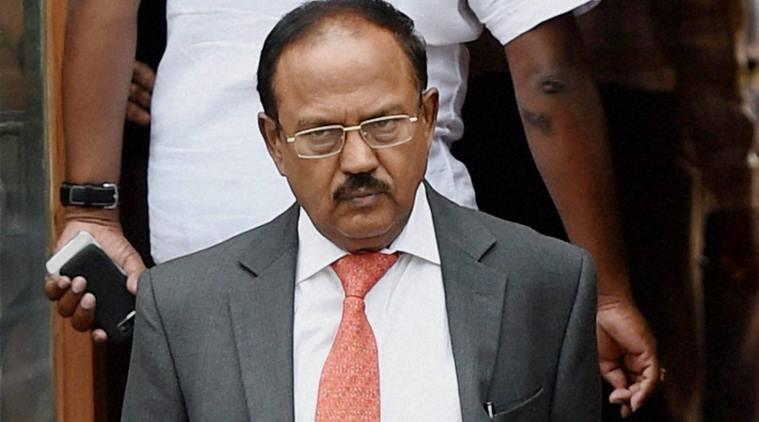When Being Strong is not a Virtue but a Liability

Speaking at the Sardar Patel Memorial Lecture on October 25th, National Security Advisor Ajit Doval ventured into electoral politics of sorts when he spoke of the country needing “a strong, stable and decisive government for next ten years to achieve our national, political, economic and strategic objectives”. He raised the spectre of a “fragmented polity”, “weak coalition government” which will prevent “hard decisions” from being taken. Coming out in favour of businessmen, he preached that populist measures need to be kept at bay for the “nation’s sake”, never mind that the wealthy 10% grow rich whereas 90% lag. He then went on to claim that “In the last four years, the collective will of the nation has been aroused, result is there for all to see”.
Ordinarily, this would have passed for one person’s opinion. After all the NSA is not a constitutional but an administrative creation. He is supposed to enjoy the Government’s trust but must be above party politics while in office. So, anything which smacks of promoting electoral politics of the ruling party are out of turn. There is weight attached to his words/remarks and pronouncements.
Interestingly, the“collective will” is anything but ‘aroused’. In the tumultuous world we live in, the BJP government has made a singular contribution by actually dividing the ‘collective will’, sapping it of its energy by stoking vitriol against minorities, dissident politics and opposition parties, employing strong-arm tactics, continued military suppression in Kashmir (where just 4.2 % participated in urban body polls in contrast to 60% turnout in 2011), while simultaneously carrying out policies that gratify the top 1% of India’s ‘fat cats’. Newsclick coverage is replete with analysis and reports of both egregious enrichment of the rich and the travails faced by the working people, tax rebates for the rich and the increased burden of tax on the working people.
Probably, the most undesired fallout of all this is the continued decimation of the public sector in general, but more vitally the slow and steady downgrading of defence public sector units (DPSUs) and the ordnance factories. The process has been three-fold; first, to begin privatisation either through outright sale of DPSUs or through gradual divestment of public ownership. Second, by deciding not to fund any new investment for upgradation and modernisation of DPSUs and OFBs and instead asking them to turn to the capital market to raise money, when profit cannot be the leit motif for military sector production. Third, by awarding military contracts to private companies while cutting down the number of items OFBs can produce, or by outright preventing the DPSUs from some production line such as heavy vehicles and naval warships.
Defence ‘navratnas’ such as Mazagon Dockyard Ltd, HAL, BEL etc are starved of orders. It needs to be reiterated, perhaps again and again, that one of the pillars of strategic autonomy and independent foreign policy is to work towards public ownership of means of production of military wares, so as to prevent dependence on outside powers as far as possible. India’s dependence for up to 70% on outside powers for weapons has long been a cause for anxiety, and there are innumerable instances where foreign suppliers (other than Soviet Union and Russia now) have stopped supplies of spare parts/components.
Anxiety has now turned to alarm. One of the main concerns which flows out of, for instance,the Rafale scam, is that a dogmatic belief in the virtue of private enterprise and dumbing of public sector can result, inadvertently or advertently, in consolidating the hold of Original Equipment Manufacturers over India’s military sector as well as bring in a corporate house whose capacity to absorb and master, for instance, aviation technology is low, thus making it virtually dependent on the partner OEM. This mismatch means that the OEM will retain control over the technology and have access to India’s defence establishment, to lobby for contracts. And every once in a while a private corporation with chronic financial weakness can venture into military sector, as happened in the Rafale scam, where its financial vulnerability compounded by nil experience in manufacturing makes it unfit for being allowed into the military sector.
The point is that the military sector is not like other sectors of economy. And must be treated apart and kept apart, where private companies ought to play a supportive role, not the main. And where Parliament can exercise oversight and ensure accountability to the people of India. In fact, the regulatory mechanism for the military sector getting privatised or dependent on capital market makes its presence felt by its absence. Had it been in place, the Reliance-Dassault deal would not have come about in the first place.
Besides, there is something called due diligence and it would have been good if Dassault Aviation had pondered over that because its laborious explanation on offset is like tying itself in knots, (by coming to BJP government’s rescue.) The point is also that for all its fault, former Defence Minister AK Anthony had shot down in 2012 Dassault’s request to bring Reliance Mukesh Ambani group for manufacturing Rafale in India. His ministry rejected this proposal from Dassault and held that public sector HAL would be the partner for manufacturing 108 Rafales as per ‘MMRCA 2012 deal-near-completion’. True, neither have OEMs come in hordes nor have DPSUs and OFBs ceased to be. But the downgrading clearly points to their decimation. And the threat looms large.
Furthermore, if one starts from 2014 when the Narendra Modi government took over,, beginning with the sordid plan to change the Land Acquisition Act (2013) that enraged the peasantry across the country which expressed its collective rejection of the attempt to bring back the Act of British vintage. In 2015, the Prime Minister arbitrarily changed the Rafale deal from acquiring 126 fighter jets (18 to be bought and 108 manufactured by HAL) to 36 in flagrant violation of laid down procedures for military procurement. The ham- handed manner of covering this up has triggered country-wide concerns, demoralising employees of DPSUs and OFBs. With demonestiation in 2016, which resulted in job loss, price rise, scarcities, suffice to paint a dismal picture. In fact the past few years have surpassed the previous four years in terms of activities of vigilantes, lynchings and rapes in which cohorts of the ruling BJP have been star performers.
If we turn our gaze to governance, things are more dismal. In his first Independence Day speech as Prime Minister on August 15, 2014, Modi had drawn attention to his “discovery” on taking over charge that “dozens of separate governments work” within the main government, and said that it “appeared everyone has its own fiefdom. I could observe disunity and conflict”.
Four years show that this has not changed. Prior to the fight within the highest echelons of the CBI being played out before us today, there have been several others with varying degree of destructive potential. The Director of Enforcement Directorate had to defend his junior who was charged with “disproportionate assets” claim by the Government, which ordered an enquiry. But more damaging was the decision of the government to come out in favour of the 700 plus armed forces personnel, rank and officers who had petitioned the Supreme Court and challenged filing of FIR and/or investigation, after the Army Chief had rebuked the petitioners and warned them of consequences which will make it difficult for the Army Headquarter to defend them.
It’s worth remembering that nothing saps the energy of the people more than when they are confronted with a ruling party which promotes the rejection of a verdict of the Constitutional bench of the Supreme Court, as is being done by BJP/RSS together with their cohorts. Worse, the threat held out by the RSS chief to the apex court over the Ram Mandir issue corroborates that BJP/ RSS are prepared to go to any length to push their violence-ridden politics to cultivate and harvest votes. Rarely has one come across a ruling party at the Centre which fuels rejection of an apex court verdict and legitimises physically prevention of the verdict from being enforced, even as they mouth their commitment to ‘Rule of Law’ and Constitution.
If this is the consequence of having a “decisive” and “strong” leadership, which has through its strong-arm measures vitiated the condition in Jammu and Kashmir, brought country to the cusp of a major religious confrontation, then there is not much to say in its favour, except that such political stewardship is detrimental to the health and welfare of the country.
Finally, it’s worth noting that decisiveness is not a virtue in itself. If decision-making involves a coterie and keeps the key stakeholders sidelined, then speedy decisions become hasty ones, prone to negative fallout. Decision, even if slow, but involving a wider circle and part of a process, is bound to be more effective. Demonetisation and Rafale are classic examples of arbitrary decision making passed off as decisiveness but with disastrous consequences for the country. Verily, ‘collective will’ cannot be created from empty boast, tough talk and premature celebration.
Get the latest reports & analysis with people's perspective on Protests, movements & deep analytical videos, discussions of the current affairs in your Telegram app. Subscribe to NewsClick's Telegram channel & get Real-Time updates on stories, as they get published on our website.























